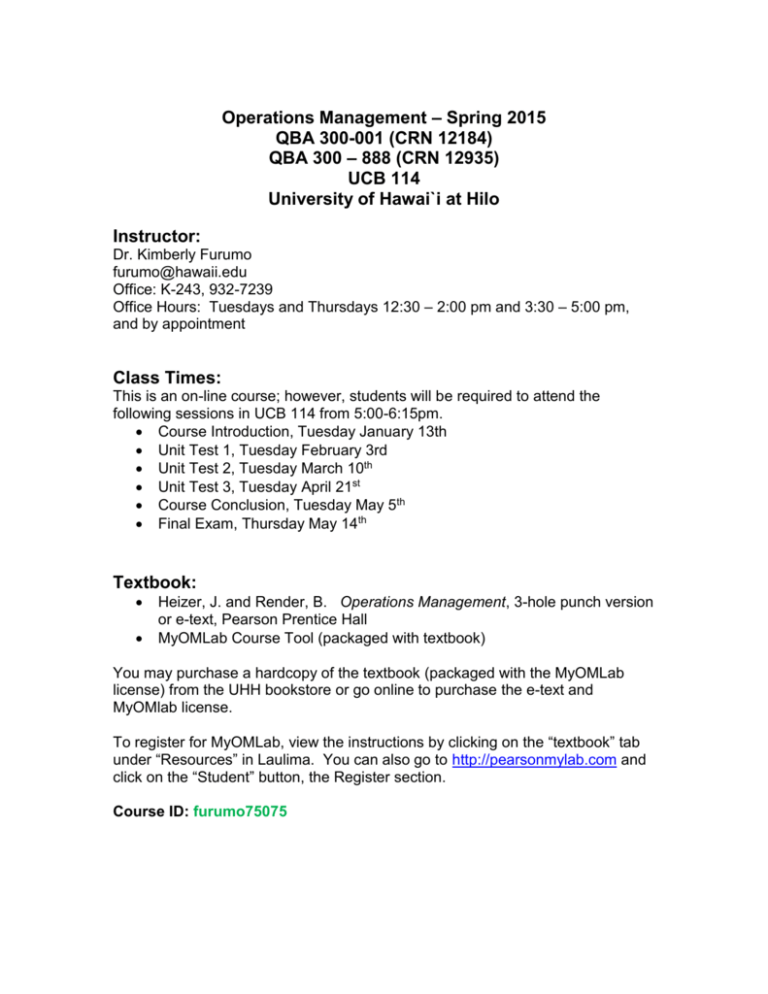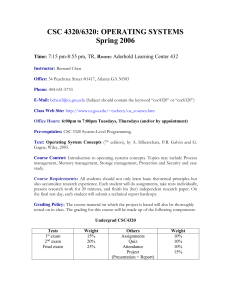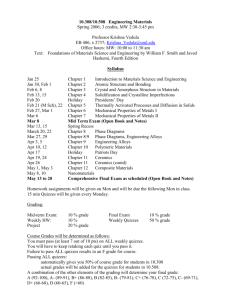
Operations Management – Spring 2015
QBA 300-001 (CRN 12184)
QBA 300 – 888 (CRN 12935)
UCB 114
University of Hawai`i at Hilo
Instructor:
Dr. Kimberly Furumo
furumo@hawaii.edu
Office: K-243, 932-7239
Office Hours: Tuesdays and Thursdays 12:30 – 2:00 pm and 3:30 – 5:00 pm,
and by appointment
Class Times:
This is an on-line course; however, students will be required to attend the
following sessions in UCB 114 from 5:00-6:15pm.
Course Introduction, Tuesday January 13th
Unit Test 1, Tuesday February 3rd
Unit Test 2, Tuesday March 10th
Unit Test 3, Tuesday April 21st
Course Conclusion, Tuesday May 5th
Final Exam, Thursday May 14th
Textbook:
Heizer, J. and Render, B. Operations Management, 3-hole punch version
or e-text, Pearson Prentice Hall
MyOMLab Course Tool (packaged with textbook)
You may purchase a hardcopy of the textbook (packaged with the MyOMLab
license) from the UHH bookstore or go online to purchase the e-text and
MyOMlab license.
To register for MyOMLab, view the instructions by clicking on the “textbook” tab
under “Resources” in Laulima. You can also go to http://pearsonmylab.com and
click on the “Student” button, the Register section.
Course ID: furumo75075
Course Description and Learning Outcomes:
This course is intended to provide students with an understanding of the
principles of operations management. “Operations” is an exciting area of
management that has a profound effect on the productivity of both manufacturing
and service organizations. Operations management includes a blend of topics
from accounting, industrial engineering, management, management science, and
statistics.
The course begins with an introduction to operations management which will
provide students with the basics of productivity, forecasting techniques, and
optimization models. Students will learn how to design and manage goods and
service operations using techniques such as statistical process control, location
and layout planning, supply-chain management, inventory management, waiting
lines, project management, and simulation.
Upon completing the course, the successful student will be able to:
Identify and explain the factors contributing to productivity
Describe the major types of project management tools
Define, describe and apply the major forecasting techniques
Understand and utilize techniques for managing quality in operations
Identify and apply various techniques used by managers to design and
manage operations, including statistical process control, and location and
layout planning
Model effective management of an operation by applying techniques of
supply-chain management, inventory management, waiting line
management, and project management.
Course Policies:
Instructional Method
Course content will be provided on-line using the UHH Laulima site and the
MyOMLab course tool site. Students are expected to read the material in the
textbook, complete sample problems using the aid of demonstration videos,
and complete quizzes and homework using the MyOMLab course tool. Unit
Tests and the Final Exam will be administered in this classroom at the
designated class time (12:30-1:45pm on either a Tuesday or a Thursday).
Academic Dishonesty Policy
Quizzes and tests must be completed individually by the assigned student.
Academic dishonesty includes representing the work of another as one's own
or cheating by any means. Academic dishonesty also includes aiding,
abetting, concealing, or attempting such activity. Since this is an on-line
course, I will pay close attention to on-line activity, including timeframes for
completion of quizzes and tests. The usual penalty is an F in the course and
disciplinary action by the University.
Documented Disabilities
Any student with a documented disability who would like to request
accommodations should contact the University Disability Services Office Hale Kauanoe A Wing Lounge, 933-0816 (V), 933-3334 (TTY),
shirachi@hawaii.edu - as early in the semester as possible.
Kilohana: The Academic Success Center
The center provides academic support opportunities for all UH Hilo students
that foster their development into independent, self-motivated learners.
Students who visit Kilohana have access to subject-specific and academic
skills tutoring from UHH students selected for their academic achievement
and dedication to helping others succeed. Kilohana is located on the lower
level of the Mookini Library and on the web at http://hilo.hawaii.edu/kilohana/
Course Grading:
Quizzes (conceptual material) = 15%
Homework = 15%
Unit Tests (3@ 15%) = 45%
Final Exam (cumulative) = 25%
Quizzes (conceptual material)
Quizzes will be delivered on-line, via the MyOMLab course tool, and
consist of multiple choice questions which will test your understanding of
the conceptual material in the chapters. You will not be asked to do
extensive numeric calculations on these quizzes. Instead, focus on the
conceptual issues raised in the chapter. Students will be given 30 minutes
to complete each quiz.
Homework
Homework will be delivered on-line, via the MyOMLab course tool, and
consist of several problems requiring mathematical computations. These
homework problems will prepare you for the Unit Tests.
Unit Tests
Three, hardcopy unit tests will be given in class. Tests will consist of
multiple choice questions which test the student’s knowledge of the
conceptual and problem solving material in the assigned chapters.
Students may use 1 notebook sheet of paper (both sides) with handwritten
notes and formulas for the test. It is recommended that you develop a set
of notes and formulas that will allow you to move quickly through exams.
Calculators will be permitted during the tests, however, cell phones will be
collected and returned after the test.
Final Exam
The final exam is a cumulative hardcopy test covering all material from the
course. The final exam will consist of multiple choice questions which test
the student’s knowledge of the conceptual and problem solving material in
the assigned chapters. Students may use 2 notebook sheets of paper
(both sides) with handwritten notes and formulas when taking the final
exam. Calculators will be permitted during the tests, however, cell phones
will be collected and returned after the test.
Makeup Exams
No Makeup tests are given. If a student misses a unit test or does poorly
on one, there is a provision to help students. If the student’s final exam
grade exceeds any one unit test score, the final exam can be counted for
both grades. For example, if you have the following scores on the unit
exams: 80%, 75%, 45% and get a 70% on the final exam. I will replace the
unit test score of 45% with the 70% you earned on the final. You may
replace only one unit test score.
Grading Scale:
The following grade scale will be used for this course. Please keep in mind that
students earn their grades while faculty simply report and record them. Grade
cutoffs are necessary and the following grading scale is firm.
Grade
Percentage
A
92% - 100%
A-
90% - 91.99%
B+
88% - 89.99%
B
82% - 87.99%
B-
80% - 81.99%
C+
78% - 79.99%
C
72% - 77.99%
C-
70% - 71.99%
D
60% - 69.99%
F
< 60%
For example, if your course average is an 81.99% you have earned a B- in the
course. If your average is an 82% (.01% higher than the 81.99%) you have
earned a B in the course. Students earning the 81.99% will generally feel that
the grading scale is “unfair” while students earning the 82% will see the grading
scale as “very fair”. However, this is the scale and I will not make exceptions in
final grades. Therefore, keep in mind that questions (such as those that follow)
will not be effective in changing my mind.
“My attendance was perfect, can you make an exception this once?”
“Is there any extra credit I can do to raise my grade?”
“I am going to lose my financial aid, can you make an exception in this
case?”
Planned Schedule (subject to change):
Week
Beginning:
Course Content and Due Dates
Requirements
Quizzes and Homework, are
completed with MyOMLab
Jan 13
Chapter 1:
Operations and
Productivity
Chapter 2:
Operations Strategy
in a Global
Environment
Module B: Linear
Programming
Jan 20
Jan 27
Chapter 4:
Forecasting
Practice Quiz
Optional
Homework - Chapter 1
Feb 3rd
Quiz 1 – Module B
Feb 3rd
Homework - Module B
Feb 3rd
Quiz 2 – Chapter 4
Feb 3rd
Feb 3
Feb 10
Feb 17
Feb 24
Chapter 4:
Forecasting
Homework – Chapter 4
Feb 3rd
Unit Test 1
Unit Test 1 (Ch’s 1,2,4, Mod B)
Feb 3rd
Chapter 5: Design of
Goods and Services
Quiz 3 – Chapter 5
Mar 10th
Chapter 6:
Managing Quality
Chapter 6S:
Statistical Process
Control
Quiz 4 – Chapter 6
Mar 10th
Chapter 7: Process
Strategy and
Capacity
Management
Chapter 7S:
Capacity Planning
Chapter 9: Layout
Strategies
Quiz 5 – Chapter 7
Mar 10th
Homework – Chapter 7S
Homework – Chapter 6S
Mar 10th
Mar 10th
Quiz 6 – Chapter 9
Mar 10th
Homework – Chapter 9
Mar 10th
Mar 3
Mar 10
Chapter 8: Location
Strategies
Homework – Chapter 8
Unit Test 2
Unit Test 2 (Ch’s 6,6S,7S,8,9)
Mar 10th
Mar 10th
Module D: WaitingLine Models
Mar 17
Module D: WaitingLine Models
Quiz 7 – Module D
Apr 21st
Homework – Module D
Apr 21st
March 24
Spring Break
Mar 31
Apr 7
Chapter 11: SupplyChain Management
Chapter 12:
Inventory
Management
Chapter 12:
Inventory
Management
Quiz 8 – Chapter 11
Apr 21st
Homework – Chapter 12
Apr 21st
Quiz 9 – Chapter 12
Apr 21st
Homework – Chapter 12
Apr 21st
Apr 14
Module F:
Simulation
Quiz 10 – Module F
Apr 21st
Homework – Module F
Apr 21st
Apr 21
Unit Test 3
Unit Test 3 (Ch’s 11,12, Mod D,F)
Apr 21st
Apr 28
May 5
Thursday
May 14th
4:10 –6:10pm
Chapter 3: Project
Management
Quiz 11- Chapter 3
May 7th
Chapter 3: Project
Management
Homework – Chapter 3
Final Exam
Final Exam (Ch’s 1, 3, 4, 6S, 7S, 8, 9, 12)
(Approximately 33% of the final will come
from Ch 3 and 67% from the other
Chapters)
May 7th








